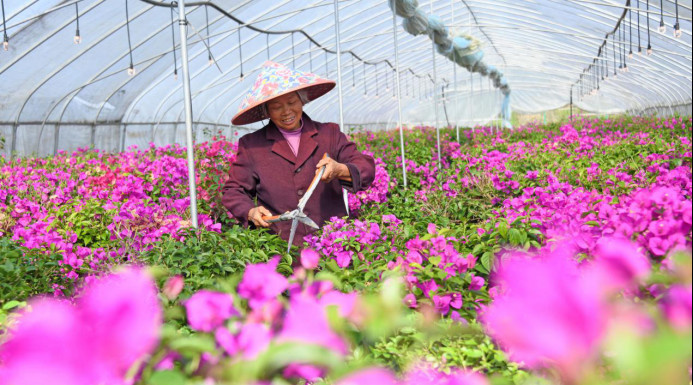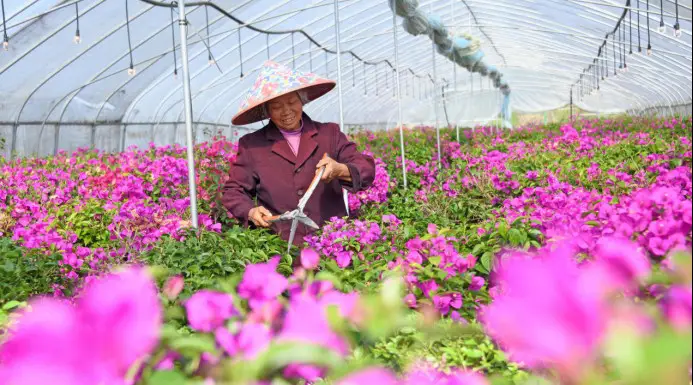By Wu Qiuyu, Li Xinping, People's Daily

A farmer trims flowers in Xianju county, Taizhou, east China's Zhejiang province. (Photo by Wang Huabin/People's Daily Online)
"The efficiency and service attitude are amazing," said Deng Xianhua, giving a thumbs-up to the staff members of a police station after getting her household registration transferred.
Deng, who lives in Wukang neighborhood in Deqing county, east China's Zhejiang province, needed to transfer her household registration to her current residence from her hometown in Anhui province as her daughter was about to attend school in Wukang.
However, she was too busy with work to go back to Anhui to handle the matter. Fortunately, through a video remote service, she got the transfer done within minutes under the guidance from the staff members at the Wukang police station.
Deng's story has gradually become the norm in the Yangtze River Delta region. In May 2019, the region launched a one-stop e-government service platform where 148 services were available. Over the past four years, Shanghai, Jiangsu, Zhejiang and Anhui in the Yangtze River Delta region have worked hand in hand to optimize this platform. As of June this year, the platform had handled over 6.4 million matters.
Chinese President Xi Jinping once stressed the need to enhance the access to basic public services in the region, so as to shore up weak links in people's livelihood while pursuing regional integration.
The ultimate goal of the integrated development of the Yangtze River Delta region is to ensure and improve people's livelihoods, and allow the general public to better share the fruits of high-quality development.
Over the past five years, Shanghai, Jiangsu, Zhejiang, and Anhui have adhered to a people-centered development philosophy, accelerating the construction of a livable Yangtze River Delta.
For the 237 million residents in the Yangtze River Delta, shared public services in transportation, education, healthcare and elderly care are the most intangible experiences brought about by integrated development.
Today, with their social security cards, the residents can take public transportation, visit museums, hit scenic areas, and receive subsidies in many cities in the Yangtze River Delta region. Since the security card has been made multi-purpose, basic public services have become more convenient in the region.
During this year's May Day holiday, a resident surnamed Huang in Hangzhou, Zhejiang province, took her family on a trip to visit relatives in Bozhou, Anhui province. According to her, they used their electronic social security cards to buy and validate tickets at tourist sites, which she found extremely convenient.
Dong Lidan, who lives in Jiashan county, Jiaxing, Zhejiang province, had similar experiences. She told People's Daily that she could have her settlement completed at the First People's Hospital of Jiashan with the electronic certificate for medical insurance.
Dong's father-in-law is from Shanghai. In the past, when he needed to purchase medication for his high blood pressure in Jiashan, he had to pay in cash first and then submit the invoices, medical records and detailed lists for reimbursement when he went back to Shanghai. And the reimbursement process took as long as some 20 working days. Now, with the direct settlement of expenses of outpatient chronic and specific diseases, it is much more convenient and worry-free, Dong said.
The Yangtze River Delta region has taken the lead in China to pilot the direct settlement of outpatient medical expenses across different cities and provinces. More than 15,000 medical institutions in 41 cities are now able to directly settle medical expenses across provinces, benefiting a total of 13 million people.
As lunchtime approached, senior residents happily enjoyed their meals at a dining hall in Zhongleshan neighborhood in Xujiahui subdistrict, Xuhui district, Shanghai. In recent years, Xuhui district has made great efforts to build integrated elderly care centers with medical, cultural, and sports facilities available within a 15-minute life circle.
Since 2018, civil affair departments in Shanghai, Jiangsu, Zhejiang, and Anhui have signed memorandums of understanding on eldercare cooperation, rolling out regional integrated eldercare pilot programs.
Shanghai and Anhui have planned to jointly construct an ecological green rehabilitation base for the aged in Anhui. Yixing in Jiangsu, Changxing county in Zhejiang, and Guangde in Anhui have signed an agreement to set up the country's first inter-provincial cross-county demonstration area for eldercare.
In Tangdi village in Shaoxing, Zhejiang province, 98 percent of the labor force is engaged in flower and plant production and relevant businesses.
"We have taken powerful steps on the path towards achieving common prosperity, so that the masses can truly enjoy the fruits of development," said Liu Jianming, Party head of the village and the director of the village committee. By leveraging the village's advantages in the floriculture business, per capita income for villagers reached 120,000 yuan ($16,934) in 2022.
In 2022, the Executive Committee of the Yangtze River Delta Integration Development Demonstration Zone, together with the governments of Shanghai's Qingpu district, Jiangsu's Wujiang district and Zhejiang's Jiashan county, issued an action plan on achieving common prosperity in the Yangtze River Delta Ecological Green Integrated Development Demonstration Zone, the first cross-provincial plan of its kind in China.
According to the plan, the per capita GDP in the zone is expected to reach 150,000 yuan, and the income gap between urban and rural residents should be no more than 1.8 by 2025. The per capita disposable income of residents is targeted to reach 80,000 yuan.
The action plan sets 26 goals in six areas, including high-quality economic development, ecological progress, and regional urban-rural integration.
"The introduction of the action plan has left a strong mark on the blueprint for common prosperity in the Yangtze River Delta, and broken the provincial and municipal boundaries in achieving common prosperity. It explores new paths to shared development in the Yangtze River Delta with a broader perspective and in a greater space," said Zhou Haiwang, deputy director of the Institute of Urban and Demographic Studies, Shanghai Academy of Social Sciences.
Deng, who lives in Wukang neighborhood in Deqing county, east China's Zhejiang province, needed to transfer her household registration to her current residence from her hometown in Anhui province as her daughter was about to attend school in Wukang.
However, she was too busy with work to go back to Anhui to handle the matter. Fortunately, through a video remote service, she got the transfer done within minutes under the guidance from the staff members at the Wukang police station.
Deng's story has gradually become the norm in the Yangtze River Delta region. In May 2019, the region launched a one-stop e-government service platform where 148 services were available. Over the past four years, Shanghai, Jiangsu, Zhejiang and Anhui in the Yangtze River Delta region have worked hand in hand to optimize this platform. As of June this year, the platform had handled over 6.4 million matters.
Chinese President Xi Jinping once stressed the need to enhance the access to basic public services in the region, so as to shore up weak links in people's livelihood while pursuing regional integration.
The ultimate goal of the integrated development of the Yangtze River Delta region is to ensure and improve people's livelihoods, and allow the general public to better share the fruits of high-quality development.
Over the past five years, Shanghai, Jiangsu, Zhejiang, and Anhui have adhered to a people-centered development philosophy, accelerating the construction of a livable Yangtze River Delta.
For the 237 million residents in the Yangtze River Delta, shared public services in transportation, education, healthcare and elderly care are the most intangible experiences brought about by integrated development.
Today, with their social security cards, the residents can take public transportation, visit museums, hit scenic areas, and receive subsidies in many cities in the Yangtze River Delta region. Since the security card has been made multi-purpose, basic public services have become more convenient in the region.
During this year's May Day holiday, a resident surnamed Huang in Hangzhou, Zhejiang province, took her family on a trip to visit relatives in Bozhou, Anhui province. According to her, they used their electronic social security cards to buy and validate tickets at tourist sites, which she found extremely convenient.
Dong Lidan, who lives in Jiashan county, Jiaxing, Zhejiang province, had similar experiences. She told People's Daily that she could have her settlement completed at the First People's Hospital of Jiashan with the electronic certificate for medical insurance.
Dong's father-in-law is from Shanghai. In the past, when he needed to purchase medication for his high blood pressure in Jiashan, he had to pay in cash first and then submit the invoices, medical records and detailed lists for reimbursement when he went back to Shanghai. And the reimbursement process took as long as some 20 working days. Now, with the direct settlement of expenses of outpatient chronic and specific diseases, it is much more convenient and worry-free, Dong said.
The Yangtze River Delta region has taken the lead in China to pilot the direct settlement of outpatient medical expenses across different cities and provinces. More than 15,000 medical institutions in 41 cities are now able to directly settle medical expenses across provinces, benefiting a total of 13 million people.
As lunchtime approached, senior residents happily enjoyed their meals at a dining hall in Zhongleshan neighborhood in Xujiahui subdistrict, Xuhui district, Shanghai. In recent years, Xuhui district has made great efforts to build integrated elderly care centers with medical, cultural, and sports facilities available within a 15-minute life circle.
Since 2018, civil affair departments in Shanghai, Jiangsu, Zhejiang, and Anhui have signed memorandums of understanding on eldercare cooperation, rolling out regional integrated eldercare pilot programs.
Shanghai and Anhui have planned to jointly construct an ecological green rehabilitation base for the aged in Anhui. Yixing in Jiangsu, Changxing county in Zhejiang, and Guangde in Anhui have signed an agreement to set up the country's first inter-provincial cross-county demonstration area for eldercare.
In Tangdi village in Shaoxing, Zhejiang province, 98 percent of the labor force is engaged in flower and plant production and relevant businesses.
"We have taken powerful steps on the path towards achieving common prosperity, so that the masses can truly enjoy the fruits of development," said Liu Jianming, Party head of the village and the director of the village committee. By leveraging the village's advantages in the floriculture business, per capita income for villagers reached 120,000 yuan ($16,934) in 2022.
In 2022, the Executive Committee of the Yangtze River Delta Integration Development Demonstration Zone, together with the governments of Shanghai's Qingpu district, Jiangsu's Wujiang district and Zhejiang's Jiashan county, issued an action plan on achieving common prosperity in the Yangtze River Delta Ecological Green Integrated Development Demonstration Zone, the first cross-provincial plan of its kind in China.
According to the plan, the per capita GDP in the zone is expected to reach 150,000 yuan, and the income gap between urban and rural residents should be no more than 1.8 by 2025. The per capita disposable income of residents is targeted to reach 80,000 yuan.
The action plan sets 26 goals in six areas, including high-quality economic development, ecological progress, and regional urban-rural integration.
"The introduction of the action plan has left a strong mark on the blueprint for common prosperity in the Yangtze River Delta, and broken the provincial and municipal boundaries in achieving common prosperity. It explores new paths to shared development in the Yangtze River Delta with a broader perspective and in a greater space," said Zhou Haiwang, deputy director of the Institute of Urban and Demographic Studies, Shanghai Academy of Social Sciences.
 Menu
Menu
 Integrated development of Yangtze River Delta region promotes better livelihood
Integrated development of Yangtze River Delta region promotes better livelihood
















